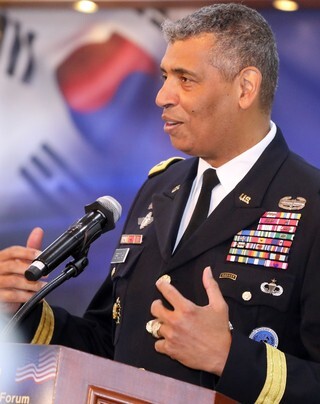hankyoreh
Links to other country sites 다른 나라 사이트 링크
USFK commander recognizes need to halt joint military exercise

On June 27, Vincent Brooks, commander of US Forces Korea (USFK), said that the South Korea-US joint military exercises that had recently been suspended were “visible exercises that are right up front that may cause unnecessary irritation at a time when the need for trust building is so important.”
Brooks made the comment while delivering a speech at the 2nd South Korea-US Alliance Forum, which was held at Army Hall in Yongsan, Seoul, on Wednesday. The forum was organized by the Korea-US Alliance Foundation, which is chaired by Jeong Seung-jo, former Chairman of the Joint Chiefs.
Brooks responded to concerns that the recent suspension of joint exercises was creating a vacuum in South Korea and the US’s joint defensive stance by noting that not all exercises and drills are being suspended. “I don’t have any such instruction coming my way [from my superiors to halt all military training]”, Brooks said, adding that it was necessary to adjust exercises and drills to make it possible for leaders to be resolute in diplomacy.
According to Brooks, US forces would maintain readiness by finding innovative ways to carry out joint exercises. Adjustments could be made to their scale, timing and scenario so that the continuing exercises are not provocative, he said, tackling concerns about a training vacuum head on. The goal of drills and exercises is strengthening military readiness, but they sometimes have consequences that go beyond that, Brooks said, emphasizing the importance of managing the message.
Depending on how exercises are handled, he said, they can inspire fear in an enemy, or they can communicate the willingness to engage in dialogue by being quiet and low-key. Brooks emphasized the importance of being flexible about the exercises. His remarks suggest that the recent suspension of the Freedom Guardian exercises and the Korea Marine Exercise Program – joint exercises between South Korea and the US – was necessary to support the denuclearization talks with North Korea and that joint exercises will be conducted quietly and without much fanfare in the future.
While addressing the rapid change in affairs on the Korean Peninsula, Brooks observed that North Korea has carried out more than 50 provocations since he became commander of USFK in Apr. 2016. He described the current situation as something that had once been unimaginable. There have been no provocations for 283 days, since the missile launch on Nov. 29, 2017, he added.
This is a time of both fear and opportunity, Brooks said. He explained that he understands why some people feel suspicious, since their suspicions are based on North Korea’s pattern of behavior in the past. But history is not built on mindless suspicions, he went on to say. He emphasized a new attitude toward North Korea, remarking that countries that have long been enemies must take a step forward if they are to build trust and achieve peace.
Brooks dismissed speculation about the withdrawal of US troops from South Korea. “We shouldn’t have any worry or doubt about the departure of US forces,” he said, emphasizing that neither President Trump, President Moon, US Congress nor South Korea’s National Assembly are “interested in doing that right now.”
Brooks believes that US troops should remain stationed in South Korea. He argued that US forces are in the country to prevent war and that they still have a lot of work to do, at least until peace is completely in place.
When asked whether North Korea’s nuclear arsenal was being unofficially tolerated by dialogue with the US, Brooks said that was impossible. A nuclear-armed North Korea could never be allowed, he said.
By Park Byong-su, senior staff writer
Please direct comments or questions to [english@hani.co.kr]

Editorial・opinion
![[Guest essay] Preventing Korean Peninsula from becoming front line of new cold war [Guest essay] Preventing Korean Peninsula from becoming front line of new cold war](https://flexible.img.hani.co.kr/flexible/normal/500/300/imgdb/original/2024/0507/7217150679227807.jpg) [Guest essay] Preventing Korean Peninsula from becoming front line of new cold war
[Guest essay] Preventing Korean Peninsula from becoming front line of new cold war![[Column] The state is back — but is it in business? [Column] The state is back — but is it in business?](https://flexible.img.hani.co.kr/flexible/normal/500/300/imgdb/original/2024/0506/8217149564092725.jpg) [Column] The state is back — but is it in business?
[Column] The state is back — but is it in business?- [Column] Life on our Trisolaris
- [Editorial] Penalties for airing allegations against Korea’s first lady endanger free press
- [Editorial] Yoon must halt procurement of SM-3 interceptor missiles
- [Guest essay] Maybe Korea’s rapid population decline is an opportunity, not a crisis
- [Column] Can Yoon steer diplomacy with Russia, China back on track?
- [Column] Season 2 of special prosecutor probe may be coming to Korea soon
- [Column] Park Geun-hye déjà vu in Yoon Suk-yeol
- [Editorial] New weight of N. Korea’s nuclear threats makes dialogue all the more urgent
Most viewed articles
- 1Yoon’s broken-compass diplomacy is steering Korea into serving US, Japanese interests
- 2[Guest essay] Preventing Korean Peninsula from becoming front line of new cold war
- 3South Korean ambassador attends Putin’s inauguration as US and others boycott
- 4Behind-the-times gender change regulations leave trans Koreans in the lurch
- 5Family that exposed military cover-up of loved one’s death reflect on Marine’s death
- 6Yoon’s revival of civil affairs senior secretary criticized as shield against judicial scrutiny
- 7Japan says its directives were aimed at increasing Line’s security, not pushing Naver buyout
- 8Marines who survived flood that killed colleague urge president to OK special counsel probe
- 9Amid US-China clash, Korea must remember its failures in the 19th century, advises scholar
- 10‘Weddingflation’ breaks the bank for Korean couples-to-be